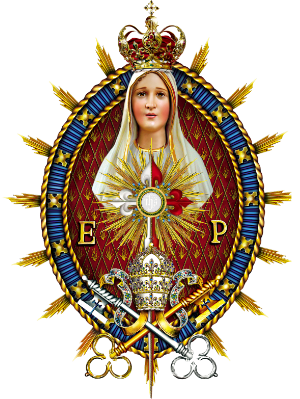Monsignor
João Scognamiglio Clá Dias
“Like a tree planted by streams of water,” (Psalm 1: 3), the Heralds of the Gospel soon “spread its branches” in over 70 countries, producing abundant fruit.
In view of this prodigious expansion, many wonder:
What is the secret of this rapid growth? What is behind the Heralds?
Everything becomes clearer when we go back to the beginning.
This is where it all started.

Our Founder
Monsignor João Scognamiglio Clá Dias, E.P., an honorary canon of the Papal Basilica of Saint Mary Major in Rome, is the founder of the international private association of Christ’s faithful of pontifical right Heralds of the Gospel, of the clerical society of apostolic life Virgo Flos Carmeli and of the society of apostolic life for women Regina Virginum.

Early Childhood
Monsignor João Scognamiglio Clá Dias was born on August 15, 1939, in São Paulo, Brazil, His parents, António Clá Dias and Annitta Scognamiglio Clá Dias, were immigrants from Europe. His father, a Spaniard from Cádiz, and his mother, an Italian from Rome, imbued their home with a deep Catholic faith, which they had received from their forebears and which was still vibrant. This lively faith manifested itself early in João.
He was baptized on June 15 of the following year, in the Church of St. Joseph, close to his home.
From his earliest childhood, Providence endowed him with the gift of contemplation, as well as a great ease in perceiving the action of God through all of creation.
Thus, on nights when he suffered from insomnia, he would sit on the window ledge of his room to admire the stars at length.
That marvelous and slow-moving procession of twinkling lights, made a deep impression on him.
When he was five years old, he had his first encounter with the Blessed Sacrament. It was during an adoration, just as the Priest was beginning Benediction.
Inexplicably attracted by that white Host – the mystery of which had yet to be explained to him – as well as by that ambience of sacrality and recollection, he immediately concluded that he was before God!
The sensation of extraordinary grandeur and majesty, together with the effect of Jesus’ infinite goodness, for the young João was an invitation to be good. It was the starting point of a Eucharistic devotion which, with years, would only grow and become more sublime.
At school, Monsignor João Clá always stood out as the top student in the class, displaying a special aptitude for Mathematics and the Arts. However, the Catechism classes and the narratives of Sacred History were what delighted him and nourished his faith.
His Confirmation, on January 26, 1948, as well as his First Communion, on October 31 of the same year, further increased his enthusiasm for everything related to the supernatural life and to Religion.
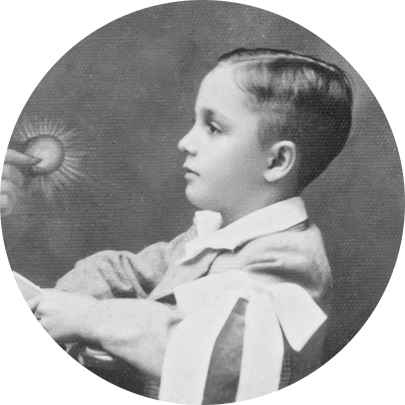
First Communion

Adolescence
In his early adolescence, he found himself at odds with the moral decline and vulgarity already prevalent in society at that time. He lamented that no one stood up with sufficient energy to fight these trends.
In his youthful heart, he longed to somehow transpose the beautiful sidereal harmony he had contemplated in his childhood to the social interaction of his companions, with a religious note. It was the breath of the Holy Spirit, urging him to serve others within the sacred walls of the Holy Church.
Under the impulse of these graces, this aspiration to help his peers soon became more pronounced. Hence his propensity for Medicine, Psychology, and the Arts. Along with the dream of founding an association for the youth, with the goal of safeguarding them from perdition, drawing them to God and supporting them on the path of perfection.
He was distressed to see how many people allowed themselves be enslaved by egoism, and were motivated solely by personal interest.
However, a certainty, stemming from faith, said to him, “There must be one entirely good and selfless man in the world! He is somewhere along my path, and the day will come when I will meet him.”
Thus, at night, he would kneel at the foot of his bed and earnestly pray thirty Hail Marys, asking to soon meet this man. Whose silhouette he had hazily glimpsed, as a special favor from Heaven.
On July 7, 1956, the first day of the novena to Our Lady of Carmel, Monsignor João Clá met Plinio Corrêa de Oliveira, the man who would illuminate his paths, convoking him to be a son of the Holy Catholic Church in the fullest sense, so as to fight with her, in her and for her, for the good order of society.
He had found what he was seeking, and it filled him with joy! He was almost 17 years old at the time.
For his part, Dr. Plinio Corrêa de Oliveira – Catholic leader who marked the twentieth century from start to finish with the brilliance of his faith and fearless militancy for the ideals of the Catholic Church – had, as a boy, envisioned the constitution of a religious Order of Chivalry, destined to work with public opinion to reform it.
In 1928, having entered the Catholic Movement as a member of the Marian Congregations, Dr. Plinio Corrêa de Oliveira gathered around him a nucleus of friends, but he had no one who truly shared his ideals.
Years later, in a letter to Monsignor João Clá, he wrote, recalling the hardships of that time of isolation: “Do you recall that supplication which was sung in the Marian Congregation: ‘Da pacem, Domine, in diebus nostris, quia non est allius qui pugnat pro nobis nisi Tu, Deus noster – Give peace, Lord, in our days, for there is no one who fights for us if not Thee, our God’? How many times did I make this my prayer! That Our Lady give me peace in my days, for there was no one who fought for me except for Deus noster, or She herself. But She later gave me a João, a great fighter for me!”
Dr. Plinio went on to form Msgr. João’s mentality, and strengthen him to persevere in the decisions embraced through his cogent influence. It was owing to the logic of Dr. Plinio’s magnificent expositions, the clarity of his thought, as well as to the agreeable aroma of his innocence that Monsignor João Clá decided to abandon everything and everyone, so as to better serve God under his guidance and counsel.
Next to Dr. Plinio, Monsignor João Clá spent forty years of close association with the supernatural, nobility of soul, elevation of spirit, zeal for the Church and society, all within the utmost veneration for any and every hierarchy – particularly, of the Papacy.
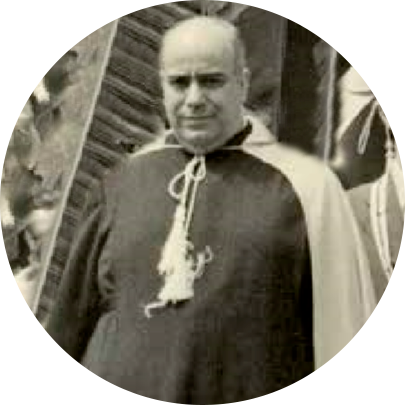
Encounter with Dr. Plinio

Marian Congregation
Between 1957 and 1960, as a preamble to the apostolic feats that he would accomplish, Monsignor João Clá joined the Marian Congregations, was admitted to the Third Order of Carmel and consecrated himself as a slave of love to the Blessed Virgin according to the method of St. Louis-Marie Grignion de Montfort.
In 1958, he was called upon to perform military service at the newly created 7th Company of the Guard, of the 25th Infantry Battalion of São Paulo.
There he excelled in discipline, command voice and military ability, which earned him the Marshal Hermes da Fonseca Medal, “Most Distinguished Recruit”, among the 208 conscripts enrolled that year.
Additionally, he was awarded a diploma of “Honorable Mention”, “for good comportment displayed during his time in the Army ranks, working for the benefit of the Unit and attaining with his efforts the high esteem enjoyed by this 7th Company of the Guard.”
Additonally, Monsignor João Clá perfected his musical knowledge with the renowned maestro Miguel Arqueróns, director of the Paulistano Chorus of the Municipal Theatre of São Paulo. Aware of the effectiveness of music as a means of evangelization.
Dr. Plinio’s excellent mother, Dona Lucilia Ribeiro dos Santos Corrêa de Oliveira, was for Monsignor João Clá, in his own words, “the guardian angel” who helped him to deeply understand the infinite mercy of the Sacred Heart of Jesus.
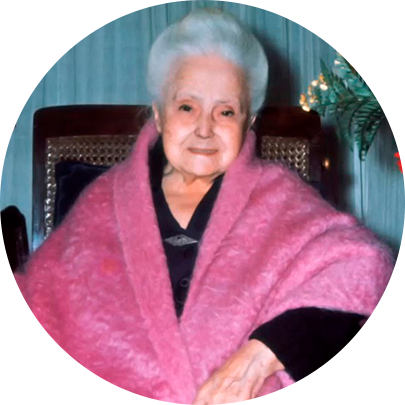
Dona Lucilia
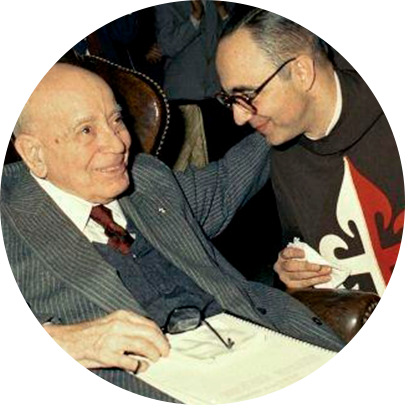
Closer to Dr. Plinio
Starting in 1975, the figure of Monsignor João Clá acquired a greater radius of influence at Dr. Plinio’s side: he became the mentor of thousands of youths from various nations, helping them and strengthening them in their faith, in an attitude of true “solicitude for all the churches” (2 Cor 11:28).
Some he snatched from the claws of the devil, others he encouraged in the pursuit of perfection… He even initiated new methods of apostolate.
He opened numerous houses of formation in several countries, where life of prayer, study and religious ceremonial combined with the missionary apostolate. With a note of discipline and combativeness inherited from his period of military service.
It was thus that Monsignor João Clá, imbued with the gift of Wisdom, was able to carry out the sublime catholic ideal of Dr. Plinio.
His natural and supernatural qualities, his excellent service, intrepidness and fidelity led Dr. Plinio to consider him as an “arch-son”, on different occasions calling him “the staff of my old age”, a “golden aide”, a “blessed instrument” and even an “alter ego”– other self. Dr. Plinio once wrote: “Justice demands that I say this: no one has given me so many and such great joys as you have.”
When Dr. Plinio passed away on October 3, 1995, Monsignor João Clá, confronted the physical absence of this fundamental figure in his life.
In 1999, Monsignor João Clá decided to found the International Private Association of the Faithful Heralds of the Gospel. Which received the approval of St. John Paul II on February 22, 2001, making it the first pontifical association of the third millennium.
With the blessings of the Chair of Peter, the association soon spread to 78 nations and began to constitute a sizable and brilliant entity, made up mostly of young people.
Marian Missions in parishes, the Mary Queen of All Hearts Shrine Apostolate, visits to families, prisons and hospitals, direct mailing services to millions of people, the Future and Life Project in Schools, TV-Arautos and Gaudium Press news agency, and the Mercy Help Fund are some of the activities undertaken by the Heralds in the most varied sectors of society.
Thanks to the apostolate carried out by Monsignor João Clá, a large group of young women desiring to give themselves to God according to the charism of the Heralds of the Gospel also flourished. They received their definitive structure on December 25, 2005, with the founding of the Society of Apostolic Life Regina Virginum, approved a few years later, on April 26, 2009, by Pope Benedict XVI.
Living in separate communities of men and women, these young people embrace a life of profound spirituality, including daily participation in the Eucharist, adoration of the Blessed Sacrament, and the praying of the Rosary and the Liturgy of the Hours. In addition to the practice of the evangelical counsels of obedience, chastity and poverty, they observe an “Ordo of Customs” carefully formulated by Mgr. João, which can be summed up in the phrase of Our Lord Jesus Christ: “Be perfect, therefore, as your heavenly Father is perfect” (Mt 5:48).
Their garb symbolizes the vocation to which they are called: a brown scapular, of Carmelite inspiration, with a large cross of white, red and gold, signifying spotless purity, readiness for every sacrifice demanded in the service of the Church, and the nobility of their ideal. The chain worn around the waist attests to the slavery of love to the Most Holy Virgin, and the rosary, hanging from the right side, is an efficacious arm in the fight against the world, the flesh and the devil.
Under the guidance and motivation of Monsignor João Clá arose the cooperators of the Heralds of the Gospel, selfless volunteers who dedicate their available time, amid family or professional obligations, to the evangelization, to the spreading of devotion to Mary, to bringing comfort to the sick and the imprisoned, to catechesis and liturgical animation in parishes and other apostolic endeavours. They wear a characteristic white cape with a red cross.
The greater family of the Heralds of the Gospel currently includes approximately 10 million members on five continents.
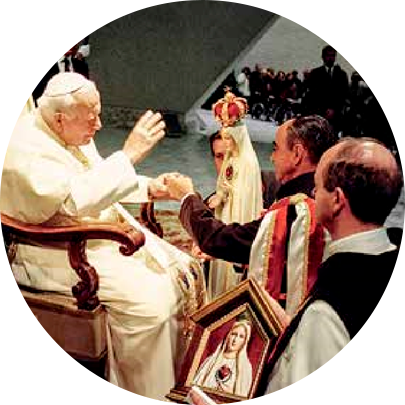
Pontifical Approval of the Heralds of the Gospel
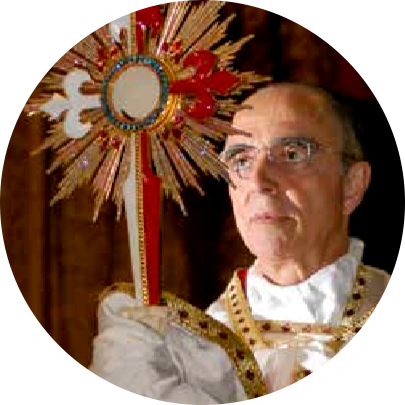
Doctorate in Theology and Canon Law
With the intellectual, spiritual and doctrinal formation of his followers in mind, Msgr. João completed Thomistic theological studies with great professors from the University of Salamanca and the Angelicum in Rome.
Among them are Fr. Victorino Rodríguez y Rodríguez OP, Fr. Antonio Royo Marín OP, Fr. Fernando Castaño OP, Fr. Esteban Gómez OP, Fr Arturo Alonso Lobo OP, Fr. Raimondo Spiazzi OP and Fr Armando Bandera OP.
In addition to studying Law at the traditional Largo São Francisco Faculty in São Paulo, he also received a licentiate in Humanities from the Madre y Maestra Pontifical Catholic University, in Santo Domingo, Dominican Republic; he obtained a Master’s degree in Psychology from the Catholic University of Bogotá, Colombia; a Doctorate in Canon Law from the Pontifical University of St. Thomas Aquinas (Angelicum) in Rome, as well as in Theology from the Pontifical Bolivarian University in Medellin, Colombia.
Monsignor João Clá is also a member of the International Society of Thomas Aquinas (SITA), of the Marian Academy of Aparecida, and was a member of the Pontifical Academy of the Immaculate. He was decorated in several countries for his cultural and scientific activity, receiving the Sciences Medal of Mexico and the Anchieta Medal, considered the highest award of honor in the city of São Paulo.
Monsignor João Clá has also founded the Aristotelian-Thomistic Philosophical Institute (IFAT) and the St. Thomas Aquinas Theological Institute (ITTA), as well as the St. Scholastica Philosophical-Theological Institute (IFTE), for the feminine branch.
“I wish to unite myself more to Jesus, I want to be His means to absolve all those seeking divine forgiveness, I want to be consumed like a host in His service for the benefit of my brothers and sisters” (Letter, 25/4 / 2005).
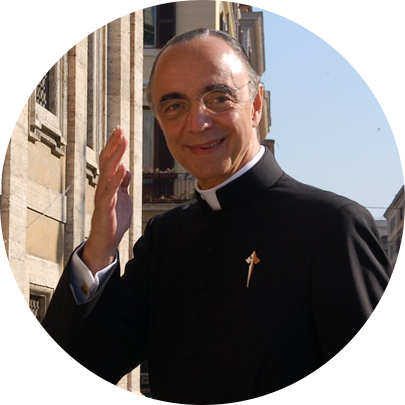
Priesthood
Pro Eclesia et Pontifice
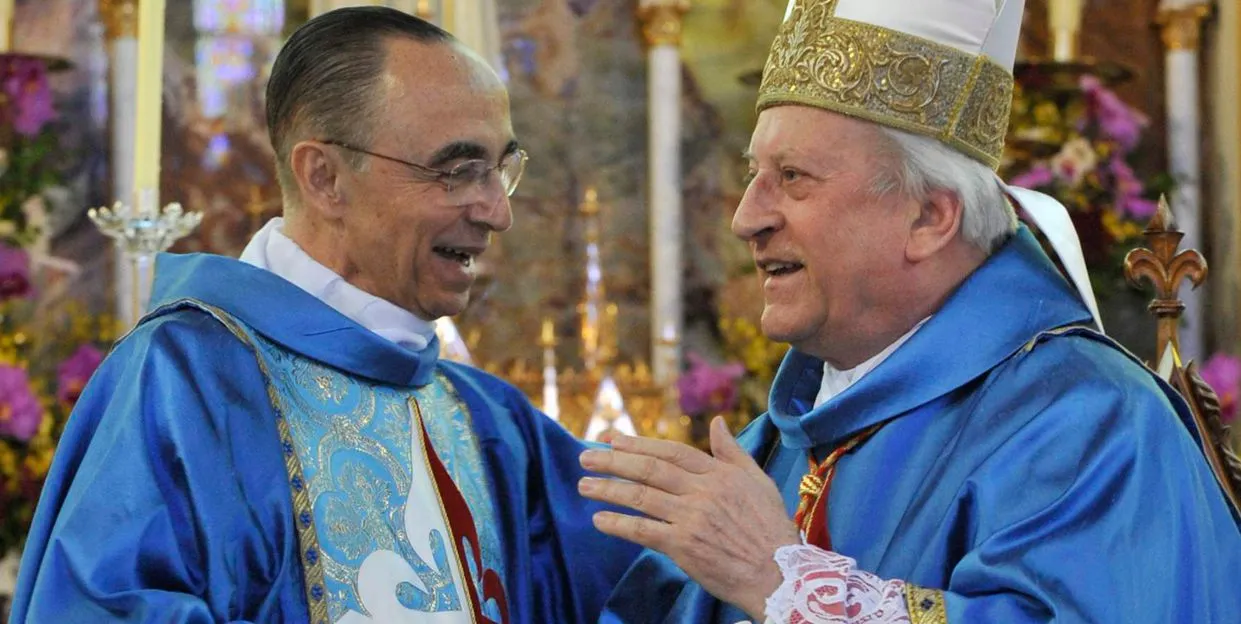
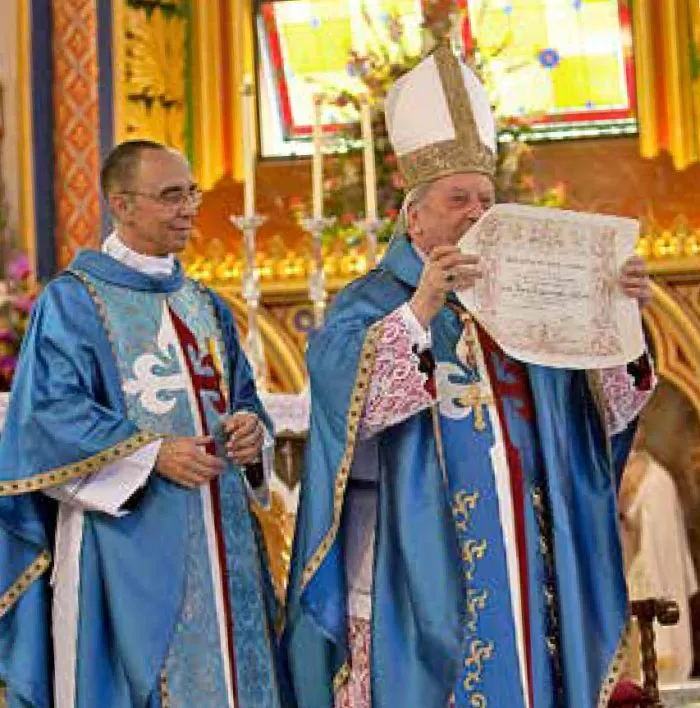
In recognition of Monsignor João Clá’s long and dedicated service to the Church, the Holy Father Benedict XVI awarded him the “Pro Eclesia et Pontifice” Medal, on August 15, 2009. One of the highest honors bestowed by the Supreme Pontiff.
It is given to those who distinguish themselves by their endeavors on behalf of the Church and the Roman Pontiff.
The medal was personally delivered to Monsignor João Clá by Cardinal Franc Rodé, Prefect of the Congregation for the Institutes of Consecrated Life and the Societies of Apostolic Life.
Determined to dedicate himself to the apostolate, his fidelity to the Saint Peter and fully conscience of the necessity of a complete doctrinal formation, led him to study theology with the great professors of the University of Salamanca, Spain, such as, the Reverend Arturo Alonso Lobo, O.P., the Reverend Marcelino Cabreros de Anta, C.M.F., the Reverend Victorino Rodríguez y Rodríguez, O.P., the Reverend Esteban Gómez, O.P., the Reverend Antonio Royo Marín, O.P., the Reverend Teófilo Urdánoz, O.P., and the Reverend Armando Bandera, O.P. In grateful recognition to his teachers he later published short biographies of many of them in English and Spanish, such as, Antonio Royo Marin, O.P.: A Master on the Spiritual Life, a Brilliant Preacher, and a Famous Writer, and Fr. Cabreros de Anta, C.M.F.: A Firm Pillar of Canon Law in Our Century.
His desire for perfection spurred him to make a first attempt to form a community in a former Benedictine edifice in São Paulo in 1970. None of the companions that joined him in that first attempt persevered. But, in spite of numerous difficulties, a community finally took root and blossomed into a movement for evangelization led by Monsignor João Clá. From this initial foundation many others were established where members can dedicate themselves to prayer and to study in preparation for works of evangelization. This movement later obtained canonical recognition as a Private Association of Christ’s Faithful, the Heralds of the Gospel, in the diocese of Campo Limpo, Brazil.
Spreading beyond the borders of Brazil, houses were established in more than twenty countries.
Consequently it was elevated to a Private Association of Christ’s Faithful of Pontifical Right by the Pontifical Council of the Laity on February 22, 2001. Today it carries out activities in seventy-eight countries on five continents. Shortly after receiving pontifical approbation, the Vicariate of Rome entrusted the care of the Church of St. Benedetto in Piscinula to the Heralds of the Gospel.
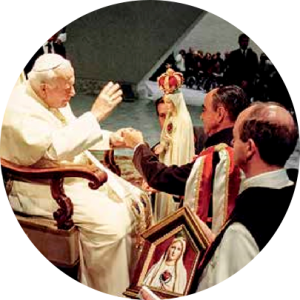
As President General of Heralds of the Gospel, Monsignor João Clá, discerned a similar grace among a group of young women who wanted to consecrate themselves to the apostolate. For this reason he saw the need to establish a branch for women who could live in community with a lifestyle similar to the communities of men. The branch of women has likewise witnessed rapid growth and the Holy Father formally recognized the Society of Apostolic Life Regina Virginum on April 4, 2009.
All of Monsignor João Clá’s undertakings are a testimony to his faith, a faith that is lively and bold, joyful and intrepid. Endowed with a remarkable gift for oratory, he has lectured to packed audiences in Europe and America demonstrating an ability to inflame hearts with enthusiasm for the truths of the faith, the courage to practice virtue and the certainty of the victory of the Holy Catholic Church in the fight against the materialism, the hedonism and the relativism of our time.
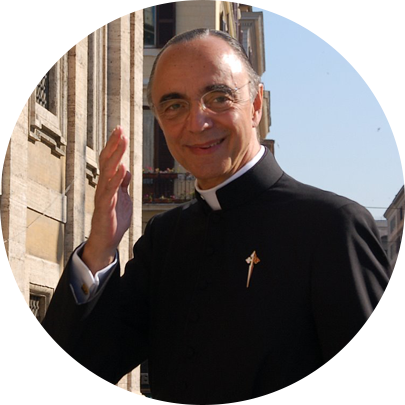
The clearest expression of his desire to serve the Lord and his brethren was Monsignor João Clá’s decision to prepare for the priestly ministry with some of his companions. Since the remote origins of Heralds of the Gospel can be traced to that group of men who become members of the Third Order of Carmel, it was only natural that a Carmelite bishop, the Most Reverend Lucio Angelo Renna, Bishop of Avezzano, Italy, would ordain the first members of the association to the priesthood.
This initial group of men were ordained together with Monsignor João Clá on June 15, 2005, in the same Basilica of Our Lady of Mount Carmel, where fifty years earlier, he began his activities in the service of the Church and his brethren. Cardinal Cláudio Hummes, the Archbishop of São Paulo, honored the occasion with his presence. Seven bishops and seventy priests concelebrated.
These priests of the Heralds of the Gospel and those which followed formed the Clerical Society of Apostolic Life Virgo Flos Carmeli, which was approved by Pope Benedict XVI on April 4, 2009. Currently Monsignor João Clá, as the founder of Virgo Flos Carmeli, is its superior general.
Gifted with a talent for music, he has established more than fifty choirs and symphonic bands in twenty-four countries. Until recently he personally directed the Heralds of the Gospel’s International Choir and Orchestra , which has performed in famous churches and theaters throughout Europe and the Americas.
Moved by the desire to extend the reach of his apostolate, Monsignor João Clá has written and published numerous books, which have enjoyed enormous success. While many of them have had print-runs in the hundreds of thousands, some of them have reached a circulation of more than a million copies. Many of these works have also been translated from the Portuguese into Spanish, English, Italian, French, Polish, and Albanian. Some of the titles include: Fatima, Aurora of the Third Millennium, The Rosary: a Prayer of Peace, The Sacred Heart of Jesus: a Treasure of Goodness and of Love, The Miraculous Medal: Story and Celestial Promises, Jacinta and Francisco, the privileged of Mary, The Luminous Mysteries of the Rosary, Daily Prayers. Four works are especially noteworthy because of the quality of the research undertaken and for their erudition: The Mother of Good Counsel of Genazzano, Dona Lucilia, Commentaries on the Little Office of the Immaculate Conception and New Insights on the Gospel.
He is member of various scholarly organizations, such as, the International Society of Thomas Aquinas and the Marian Academy of Aparecida, and his academic, cultural and scientific achievements have been recognized internationally. For example, Mexico awarded him its Medal of Science. Since 2002 he is a regular contributor to Heralds of the Gospel Magazine, where write commentaries on the Gospel. The magazine is published in Portuguese, English, Spanish and Italian.
In October 2007 Monsignor João Clá founded and has contributed to the academic journal Lumen Veritatis published by the Aristotelian-Thomist Philosophical Institute (Instituto Filosófico Aristotélico-Tomista – IFAT) and the Saint Thomas Aquinas Theological Institute (Instituto Teológico São Tomás de Aquino – ITTA).
To promote works of apostolate and charity, especially among the poor and underprivileged, Monsignor João Clá established a charitable fund, called Fundo Misericordia in order to collect and offer direct assistance to individuals and to institutions directly involved in providing aid to the needy in Brazil.
Under his guidance and with his continual encouragement, the Heralds of the Gospel International Academy opened its doors to students in 2005 significantly broadening its outreach and initiating a new era in its academic programs and activities.
His most recent accomplishments include the building of the church Our Lady of the Rosary located by the seminary of the Heralds of the Gospel. This church was raised to the rank of minor basilica by Benedict XVI in 2012. Thanks to his initiative and encouragement, several other important construction projects have been successfully concluded or are in advanced stages. This includes the notable motherhouse of the Society of Apostolic Life Regina Virginum as well as other seminaries, churches and centers for evangelization.

